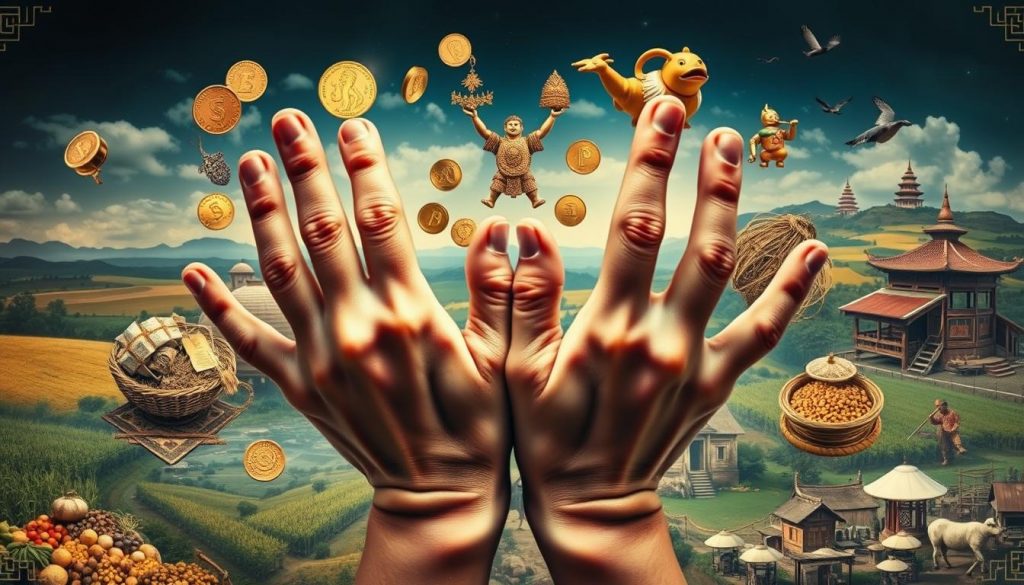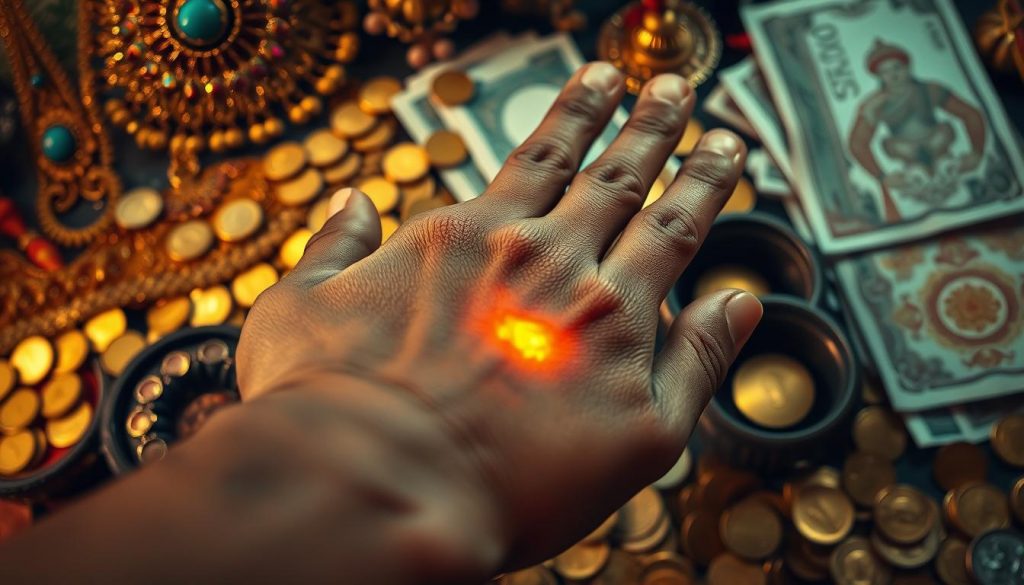Why Some Cultures Believe in Itchy Palms as a Sign of Wealth
The idea that itchy palms signal financial luck is intriguing. It crosses over cultural lines. In Turkey, an itchy right palm means money is coming. But an itchy left palm warns of losing money.
Anúncios
In the Philippines, coins are thrown during housewarming parties to bring wealth. These practices show how deeply rooted these beliefs are.
This article dives into the world of itchy palm superstitions. We’ll look at where these beliefs started and how cultures see them today. From old traditions to new views, the connection between itchy palms and money is both fascinating and tells us a lot about our desire for wealth.
The Origins of Itchy Palm Superstitions
The idea of itchy palms has deep roots in history. It’s linked to origins of superstitions about money and wealth. The Saxons and Celts of Europe believed that an itch on the palms meant money was coming.
The Saxons rubbed itchy skin on silver to cure it. This turned into a belief that an itch could mean you’d get rich. Fortunetellers in the Roman era made this belief even stronger. They linked itchy palms to money.
Anúncios
Over time, people have changed how they see this superstition. Different cultures have kept it alive in their stories. Today, many people believe it’s important for understanding money. About 60-70% of people in some places still believe in these old tales.
To learn more about these traditions, check out this article on itchy palms and their role in culture.
The Symbolism of Itchy Palms in Different Cultures
Itchy palms have different meanings in various cultures. In India, an itchy left palm means you’re about to get money. An itchy right palm means you might lose money or give it away. This shows how simple things can have deep meanings.
In Western cultures, an itchy right palm is seen as a good sign for money coming your way. This shows how different cultures see things in different ways.
Itchy palms also tie into financial superstitions. For example, eczema affects 1 in 10 adults, and 30 million in the U.S. have skin allergies. These conditions add to the idea that itches can mean money matters.
Here’s a table that shows how itchy palms are seen differently in different cultures:
| Cultural Region | Left Palm Symbolism | Right Palm Symbolism |
|---|---|---|
| Eastern Cultures | Receiving wealth | Giving or losing money |
| Western Cultures | — | Incoming financial gain |
| Chinese Culture | — | Prosperity and good fortune |
| Indian Culture | Receiving gifts | Financial sacrifices |

This shows how itchy palms can mean different things in different cultures. It’s a mix of financial beliefs and practices.
The Left Hand Itch: A Sign of Incoming Wealth
An itchy left palm is seen as a sign of wealth in many cultures. It’s believed to signal money, promotions, or new jobs. This idea has roots in the Middle Ages, where it was thought to mean wealth was coming.
Traditions say to be careful with money when your left hand itches. Scratching it might block good luck. Rubbing it on wood is thought to attract wealth and keep away bad vibes.
The link between an itchy left palm and wealth is found in many beliefs. For example:
- In some cultures, an itchy left palm means good fortune, especially for women. Men should be careful with money.
- Old traditions, like the Saxons rubbing silver on their skin, believed it brought wealth.
- Today, about 80% of Americans burn old dishcloths to avoid bad luck, showing how deep these beliefs are.
While beliefs differ, the idea is the same: an itchy left palm often means wealth is coming. This mix of old tales and everyday life shows how signs of wealth are all around us.
| Cultural Belief | Interpretation |
|---|---|
| Western Cultures | Incoming financial fortune |
| Chinese Culture | Financial caution for men; potential gain for women |
| Indian Beliefs | Future material gains associated with the left hand itch |
| Saxon Traditions | Rubbing silver brings blessings |
| Celtic Traditions | Scratching on wood for luck |
The Right Hand Itch: A Potential Financial Loss
The right hand itch sparks interesting talks in many cultures, especially about signs of financial loss. This topic has many views. Many see an itchy right palm as a sign of coming expenses or losses, adding to money superstitions.
In Western cultures, the right hand is often linked to making money. But, an itchy right palm might mean bad financial news. In Indian and Chinese cultures, the right palm can mean wealth is coming, but also warn of expenses.
It’s key to look at health reasons for a right hand itch. Issues like eczema, allergies, and diabetes can cause it. This shows why we should check for health problems before thinking it’s a wealth omen.

- Human Psychology: People often remember times when right hand itching meant money. They forget the times it didn’t.
- Palmistry Influence: Old beliefs, like rubbing an itchy palm on silver for wealth, still exist in some places.
- Varied Interpretations: An itchy right hand can mean good luck or caution with money, depending on the culture.
These different views on the right hand itch show how culture and money are connected. Thinking deeply about these ideas leads to interesting talks about wealth and money.
Gender Differences in Interpretation of Itchy Palms
Men and women see itchy palms in different ways, showing how culture affects us. For men, an itchy right palm might mean money troubles ahead. But an itchy left palm could mean good fortune is coming. Women, on the other hand, see things differently. An itchy left palm often means wealth is on its way, while an itchy right palm might signal loss.
These differences show how deeply rooted cultural beliefs are in our lives. In Eastern cultures, an itchy right palm is good luck for men but bad for women. This shows how society’s norms and expectations shape our beliefs. It also shows how gender plays a role in these superstitions.
Understanding these differences helps us see the bigger picture of financial signs and itchy palms belief. The culture and gender roles we live in shape these superstitions that many still believe in today.
Money Superstitions and Their Cultural Relevance
Money superstitions are a blend of beliefs about wealth and cultural practices worldwide. In Latin America, people put a gold ring in drinks on New Year’s Eve. In Germany, there’s a tradition of marzipan pigs. These rituals carry deep personal and collective meanings.
In Scotland, clearing debts before the New Year is believed to attract good fortune. In Colombia, picking potatoes from under the bed is seen as a sign of financial luck. These traditions show how different cultures view wealth.
In the Philippines, wearing polka dots is thought to bring wealth. In Spain, eating twelve grapes at midnight is a ritual for good luck. These practices show how cultural beliefs shape our views on money.
In the USA, eating black-eyed peas and collard greens on New Year’s Day is a tradition. It’s a mix of gratitude and hope for financial success. This shows how money is seen as a symbol of security and hope.
Studies suggest about half of Americans have superstitions about money. These beliefs are still important today. As societies change, the need for reassurance about money keeps cultural practices around wealth alive.
Common Practices and Remedies Associated with Itchy Palms
Itchy palms often lead to various cultural practices and financial superstitions. People believe rubbing an itchy palm on wood can protect against financial losses. These good luck rituals are done to attract wealth and success.
Many cultures have unique cultural practices to help with itchy palms. Actions like scratching the palm or tossing coins are seen as ways to attract money. These activities are believed to ward off bad luck.
Itchy palms are linked to skin conditions like eczema, psoriasis, and diabetes. Knowing the cause helps find the right remedy. For example, using fragrance-free moisturizers can help with dryness and itching.
In summary, health awareness meets traditional financial superstitions. This mix shows how people deal with itchy palms in a unique way. It highlights the importance of itchy palms in our lives.
| Condition | Impact on Itchy Palms | Potential Remedial Measures |
|---|---|---|
| Contact Dermatitis | Allergic reactions causing irritation | Avoid known allergens, use soothing creams |
| Eczema | Causes itching and skin irritation | Moisturizers, topical treatments |
| Psoriasis | May lead to itching and skin lesions | Medicated ointments, regular hydration |
| Diabetes | Skin dryness and itchiness due to high blood sugar | Blood sugar management, moisturizers |
| Liver Disease | Can cause systemic itching including palms | Medical treatment, skincare routines |
| Carpal Tunnel Syndrome | Can result in tingling and itching hands | Splints, physical therapy |
Conclusion
The idea that itchy palms mean wealth is interesting. It shows how cultures view money. Around the world, people see signs in their bodies and events as signs of money coming.
In Turkey, buying lottery tickets after seeing a bird is common. It shows how superstitions mix with daily life and hopes for money. This is just one example of how cultures see money.
In China, putting a purse on the floor is bad luck. It means money is slipping away. These beliefs show how actions affect money. Keeping toilet lids closed in Eastern Asia is another example.
These old beliefs show how culture, individuality, and money work together. They remind us that our money goals are shaped by our past. Knowing this can help us handle money better, with respect for its cultural value.
